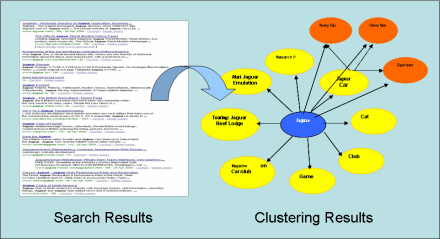| ホーム | 研究内容 | プロジェクト | メンバー | 発表論文等 | 地図&アクセス | 内部向け |
このページは参照用に保存された古いバージョンです.最新の情報はこちらをご覧下さい。
Search Results Clustering |
|
|
Automatic clustering of both source web pages as well as web search results that returned from Search Engine for a topic is one of the most important and efficient techniques to help end users in navigation, discrimination, summarization and interpretation of the Web. Most exiting clustering approaches that based on common terms sharing cannot adapt well for web page clustering in a lot of cases due to special features of web data. We proposed a novel contents-link coupled clustering approach by combining contents (terms appeared in snippet, title, meta-contents and anchor window of in-links) analysis and link analysis (co-citation and coupling analysis) to offer a much better solution for web page clustering both in terms of effectiveness and topic discrimination. We applied the proposed clustering approach to search results of various topics and got positive and interesting results. Based on term vector, we attach each cluster with tagging terms to give end users the topic of each cluster from semantic point of view. E.g. for topic "jaguar", we could obtain clusters talking about car, animal, game, driver club、magazine etc. In particular, we study in detail about the respective contributions of term, out-link and in-link on clustering procedure and in turn on how to effectively combine the two very different features (term and link) into one clustering schema to make the proposed contents-link coupled clustering adapt well to various kinds of topic for robust clustering. (Wang Yitong) |
 |